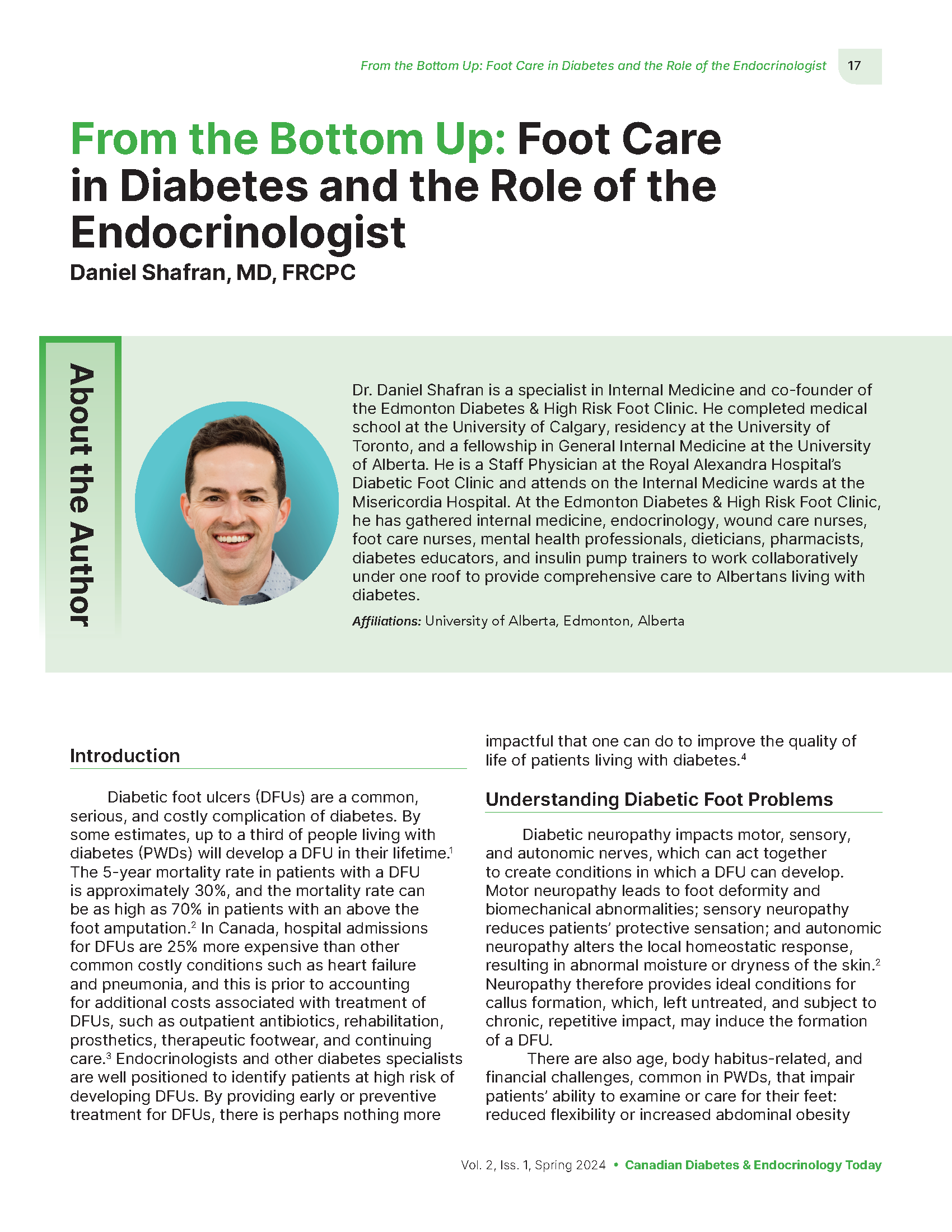From the Bottom Up: Foot Care in Diabetes and the Role of the Endocrinologist
Abstract
Diabetic foot ulcers (DFUs) are a common, serious, and costly complication of diabetes. By some estimates, up to a third of people living with diabetes (PWDs) will develop a DFU in their lifetime. The 5-year mortality rate in patients with a DFU is approximately 30%, and the mortality rate can be as high as 70% in patients with an above the foot amputation. In Canada, hospital admissions for DFUs are 25% more expensive than other common costly conditions such as heart failure and pneumonia, and this is prior to accounting for additional costs associated with treatment of DFUs, such as outpatient antibiotics, rehabilitation, prosthetics, therapeutic footwear, and continuing care. Endocrinologists and other diabetes specialists are well positioned to identify patients at high risk of developing DFUs. By providing early or preventive treatment for DFUs, there is perhaps nothing more impactful that one can do to improve the quality of life of patients living with diabetes.
References
Armstrong DG, Boulton AJM, Bus SA. Diabetic foot ulcers and their recurrence. N Engl J Med. 2017;376(24):2367-2375. doi:10.1056/NEJMra1615439
Armstrong DG, Swerdlow MA, Armstrong AA, Conte MS, Padula WV, Bus SA. Five year mortality and direct costsof care for people with diabetic foot complications are comparable to cancer. J Foot Ankle Res. 2020;13(1):16. doi: 10.1186/s13047-020-00383-2
Syed MH, Salata K, Hussain MA, Zamzam A, de Mestral C, Wheatcroft M, et al. The economic burden of inpatient diabetic foot ulcers in Toronto, Canada. Vascular. 2020;28(5):520-529. doi: 10.1177/1708538120923420
Sekhar MS, Thomas RR, Unnikrishnan MK, Vijayanarayana K, Rodrigues GS. Impact of diabetic foot ulcer on health-related quality of life: a cross-sectional study. Semin Vasc Surg. 2015;28(3-4):165-171. doi: 10.1053/j. semvascsurg.2015.12.001
Embil J, Albalawi Z, Bowering K, Trepman E. 2018 Clinical Practice Guidelines Diabetes Canada Foot Care Guidelines - Foot Care. Can J Diabetes. 2018;42:S222-S227.
Schaper NC, van Netten JJ, Apelqvist J, Bus SA, Fitridge R, Game F, et al. Practical guidelines on the prevention and management of diabetes-related foot disease (IWGDF 2023 update). Diabetes Metab Res Rev. 2023 May 27:e3657. doi:10.1002/dmrr.3657
Feng Y, Schlösser FJ, Sumpio BE. The Semmes Weinstein monofilament examination is a significant predictor of the risk of foot ulceration and amputation in patients with diabetes mellitus. J Vasc Surg. 2011;53:220-226.e1-5. doi: 10.1016/j.jvs.2010.06.100
Liu F, Bao Y, Hu R, Zhang X, Li H, Zhu D, et al. Screening and prevalence of peripheral neuropathy in type 2 diabetic outpatients: a randomized multicentre survey in 12 city hospitals of China. Diabetes Metab Res Rev. 2010;26(6):481-489. doi:10.1002/dmrr.1107
Armstrong DG, Tan T. Diabetic foot ulcers: a review. JAMA. 2023;330(1):62-75. doi: 10.1001/jama.2023.10578
Senneville E, Albalawi Z, van Asten SA, Abbas ZG, Allison G, Aragón-Sánchez J, et al. IWGDF/IDSA Guidelines on the diagnosis and treatment of diabetes-related foot infections (IWGDF/IDSA 2023), Clin Infect Dis. 2023;ciad527. doi: 10.1093/cid/ciad527
Monteiro-Soares M, Vale-Lima J, Martiniano J, Pinheiro-Torres S, Dias V, Boyko EJ. A systematic review with meta-analysis of the impact of access and quality of diabetic foot care delivery in preventing lower extremity amputation. J Diabetes Complications. 2021;35(4):107837. doi: 10.1016/j.jdiacomp.2020.107837
Luo B, Cai Y, Chen D, Wang C, Huang H, Chen L. Effects of special therapeutic footwear on the prevention of diabetic foot ulcers: a systematic review and metaanalysis of randomized controlled trials. J Diabetes Res. 2022;2022:9742665. doi: 10.1155/2022/9742665
Abbott CA, Chatwin KE, Eoden P, Hasan AN, Sange C, Rajbhandari SM, et al. Innovative intelligent insole system reduces diabetic foot ulcer recurrence at plantar sites: a prospective, randomised, proof-of-concept study. Lancet Digit Health. 2019;1(6):e308-e318. doi: 10.1016/S2589-7500(19)30128-1
Snyder R, Galiano R, Mayer P, Rogers LC, Alvarez O, Sanuwave Trial Investigators. Diabetic foot ulcer treatment with focused shockwave therapy: two multicentre, prospective, controlled, double-blinded randomized phase III clinical trials. J Wound Care. 2018:27(12):822-836. doi: 10.12968/jowc.2018.27.12.822

Downloads
Published
How to Cite
Issue
Section
License
Copyright (c) 2024 Canadian Diabetes & Endocrinology Today

This work is licensed under a Creative Commons Attribution-NonCommercial-NoDerivatives 4.0 International License.
